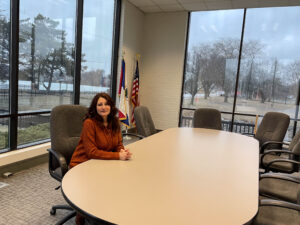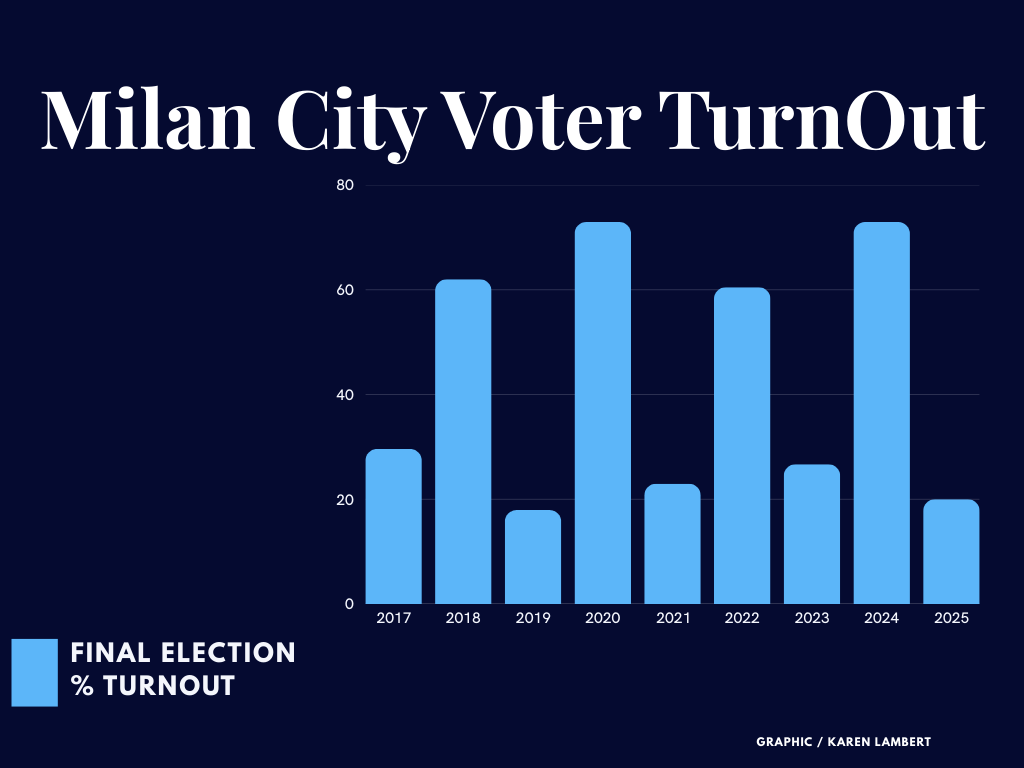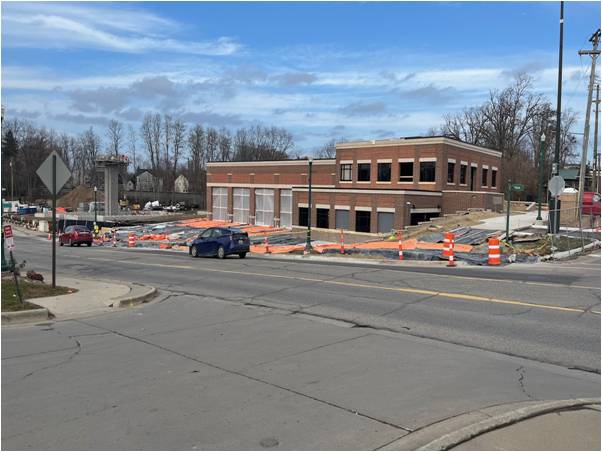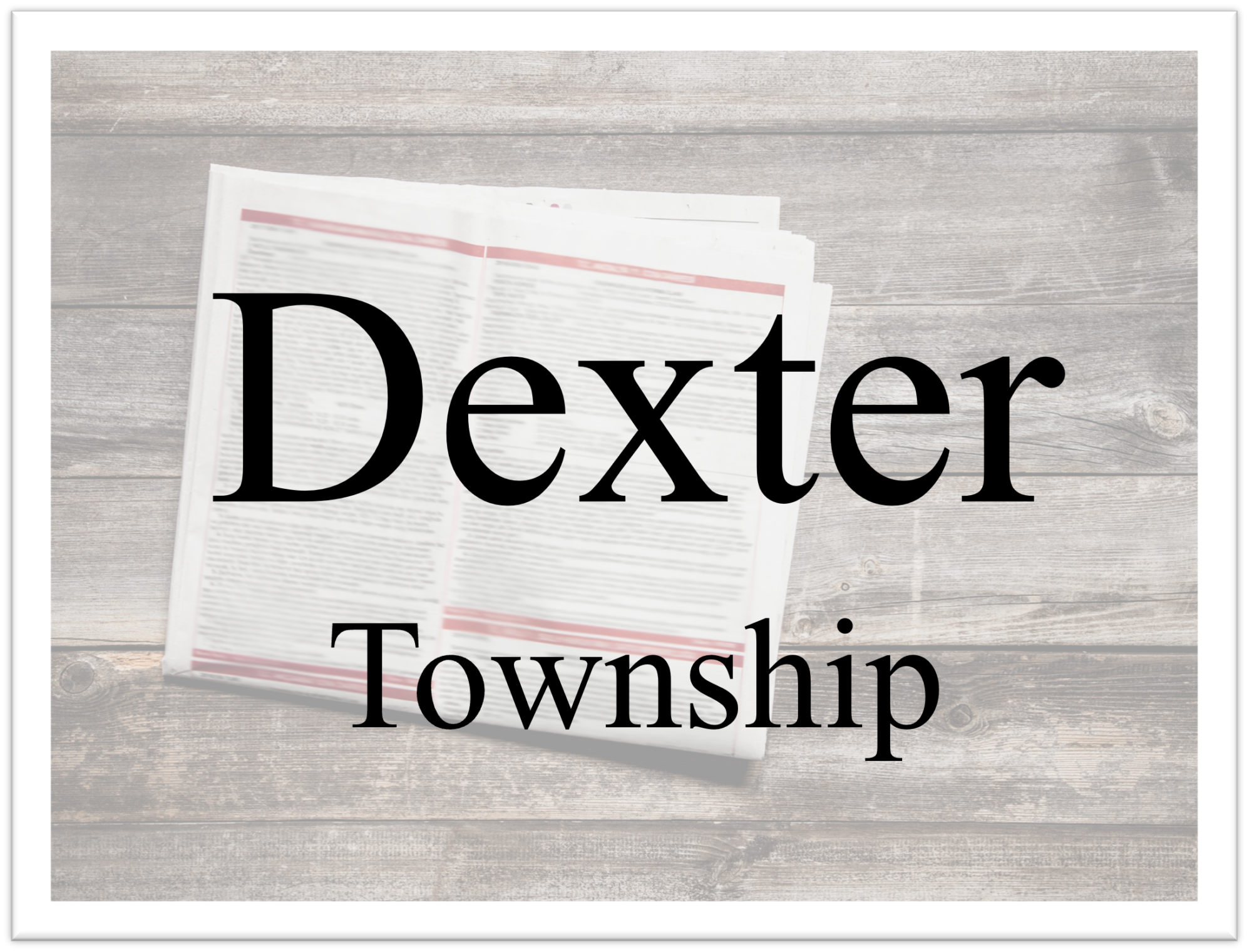UPDATE: On Oct. 7 at the Milan City Council meeting the council voted 5-1 to hold a public hearing during the regular meeting on Oct. 21 at 7 p.m. Council member David Snyder voted no and Mayor Pro Tem Shannon Wayne was absent. At the hearing, Milan City Clerk Lavonna Wenzel will give an educational Powerpoint presentation. There will be no time limits for those who would like to comment during the hearing. Following the hearing, the council will vote on whether to amend the city charter moving Milan City elections to even years.
Original Story:
Milan City Council is considering switching elections to even years, a decision that could save money and boost turnout, but also extend officials’ terms by a year and inject more partisanship into local races.
The council will vote Tuesday Oct. 7 to determine whether to set a public hearing on Oct. 21 regarding amending the city charter to allow for the change.
In the last 13 years at least 21 Michigan cities have switched their municipal elections to the same year as the state and federal elections, Milan City Clerk Lavonna Wenzel told the council at their Sept. 2 meeting. A 2012 amendment to Michigan Election law allowed for the change.
In a presentation, Wenzel and Election Specialist Susan Trudeau told the council most of the impacts would be positive, including thousands of dollars in savings for the city, better turnout of voters, freed up time for other city responsibilities, and an easier time getting election staff since there’s more interest in a presidential election. However, Wenzel told council members a one-time consequence of the change would be increased term lengths.
Terms
There would be a one-time year extension to the term for each winner for the council (5 years), library board (7 years) and mayor’s (3 years) seats, following the November election. Those not up for election, would also receive an additional year to their term, something that raised some concerns from council members.
“People already on council would have a five-year term,” Councilmember David Snyder said, “which seems like sort of a strange arrangement for the city council to vote on themselves for an extra year.”
According to Milan City Attorney Steven Mann it’s against the law for the council to shorten an elected official’s term and so the only option is a one-time change to extend terms by a year.
City Manager Jim Lancaster said it could help if they do it before the election since it’s uncertain who will win.
“I’m all for increasing voter turnout,” Mayor Pro-Tem Shannon Wayne said, adding, “As someone who’s up for election right now, I’m a little concerned about the optics.”
Wayne asked if it was possible to vote on now, but not have it take effect until into the future when it does not influence the terms of those already elected.

Milan City Clerk Lavonna Wenzel
Library Board
“That’s all news to me,” said Library Board President Larry Biederman, when The Sun Times News told him Tuesday his term could be extended by a year. However, Biederman, who has served on the library board since 2004, said he had been informed the city was considering the issue, minus that detail.
Biederman told The Sun Times News he had mixed feelings.
“[I] agree that lowering our costs is definitely a priority, but I’m very concerned that big state or national elections are going to detract from our local candidates,” Biederman said. “It will be difficult for our local candidates to get their voices visible and heard while the louder voices of the state and national campaigns are out there, constantly in our faces.”
In addition, Biederman said local candidates often support big state and national races and would be doing double the work, running their own campaigns at the same time.
However, he said he is not against it, either, but is still thinking through the pros and cons. While previously unaware it would extend his own term length, he seemed unconcerned personally, but asked whether it’s respecting voters to give elected officials a bonus year.
Cost Savings:
City Clerk Lavonna Wenzel told the council that with a primary, the city’s projected cost for the 2025 election is $50,000, which includes approximating a portion of her salary to account for her time.
Currently, the city has to pay the entire cost of printing ballots, publishing election notices, etc. If the election were changed to odd years the presidential and state elections would be the same year, allowing for shared costs.
Other organizations that wanted to renew a millage on the odd years would have to pay the full cost of the election.
Wenzel said each ballot costs the city $4.12 and by law she has to order a minimum number. During the last election they ordered 4,140 ballots. Only 1,075 of them were used.
“I have to discard over 3,000 ballots,” she said. “It’s such a waste. I have to throw all these ballots away. The envelopes we can probably reuse. ….There is so much waste.”
Impacts to voting:
Based on city data, voter turnout is currently double for presidential elections as it is for local elections, meaning the change could include the voice of many more voters.
Snyder expressed concern it would lead to less educated voters.
“Currently the 20 percent who vote [in odd years] make up a very informed electorate,” he said.
Since the nonpartisan local elections would be on the same ballot as the partisan elections, it would result in a longer ballot with the city races at the end, potentially on the back.
There are at least 22 out of Michigan’s 276 incorporated cities that have already changed from even to odd year elections, including Midland, St. Clair, Grand Rapids, Lincoln Park, and Wyoming, said Wenzel. Wenzel said there may be others as well, but those are the ones who are members of her clerk’s group. She said no cities she is aware of have expressed complaints or switched back.
Not all Michigan cities have decided to make the change. For instance, the discussion was controversial in East Lansing, where an analysis by the East Lansing Info (ELi) indicated that it likely would change which candidates won the elections. Ultimately the council decided to let the community vote on the issue, but Gov. Whitmer’s office did not approve it going on the ballot, stating that the new state law required that the change be made by councils.
Critics of the change expressed concern that moving municipal elections to the same year as partisan federal and state races would lead to nonpartisan offices like mayor and library board being more polarized when residents have a local candidate’s sign next to a divisive candidate for president and increase the number of less informed voters, rather than a core electorate who take the time to be informed on issues, according to the East Lansing Info (Eli).

Milan residents turn out in much higher numbers on even years when there are state and federal issues on the ballot than on odd years when city races have been held.


 8123 Main St Suite 200 Dexter, MI 48130
8123 Main St Suite 200 Dexter, MI 48130


